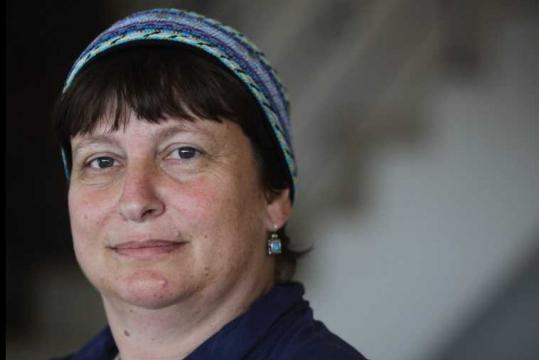|
Israeli community protects religious victims of sexual harassment and abuse
By Eliana Rudee
As Rabbanit Malka Puterkovsky addresses members of the press, her smile lights up the room and one almost forgets the dark subject about which she speaks. Puterkovsky is the founder and director of Takana, a forum that provides alternative ways to report sexual assault within Israel’s religious community. While Israel’s mainstream victims of sexual assault report directly to the police, religious victims prefer more discretion in reporting sexual crimes so that their names and photographs are not attached. To many in small and close-knit communities, anonymity is more important than reprimanding the attacker, as being assaulted and raped is often stigmatized, sometimes even more for the victim than the attacker. While in the general public, an estimated 15 percent of sexual harassment cases are brought to the police, for the religious community, the figures are drastically lower. While Takana may succeed in supporting Modern Orthodox victims of sexual assault, some argue that they also protect the abusers by taking a “soft” approach. Puterkovsky, with other Torah scholars, religious educators, jurists, and social workers, founded Takana in 2003 within the Orthodox feminist framework that is growing in Israel. “All of the deep stream changes happening in Israeli society have to do with Orthodox feminism,” says Member of Knesset Rachel Azaria, an Orthodox feminist herself. “This is a real revolution that is happening, and one of the first issues that started Orthodox feminism is realizing that there is sexual abuse in the schools and places nobody [previously] thought.” However, mainstream politicians are slow to follow suit. Azaria claims she is one of the only Israeli political leaders calling for the resignation of Etzion Bloc Mayor Davidi Perl, who was accused of sexual abuse over the past few years. Many followers of sexual abusers deny that their leader is capable of abusing children and students. Some associates of accused individuals have even gone so far as to threaten Takana members. In 2010, Takana Rabbi Aharon Lichtenstein received death threats from an associate of Rabbi Mordechai Elon, saying he would “hurt him in any way he could.” But associates of those accused are not the only ones critiquing Takana. Hannah Katsman, author and blogger of A Mother in Israel, is just one of many who argue that Takana takes too soft of an approach, thereby protecting Rabbis who commit sexual abuse. Referring to Elon’s case, Katsman argues that Takana kept the story secret for four years, leading to the abuse of new victims. Indeed, Takana never publishes names of accusers and will only release the name of the alleged attacker if they do not comply. Instead, Takana directly calls the alleged attacker, informs them of the allegations and listens to what they have to say. They work with the aggressor on their problem without punishing them or sending them to jail, but urging them to leave their job if they work with women or children and suggesting psychological specialists. The vast majority of alleged attackers have accepted the organization’s help. While Takana’s method of focusing on rehabilitation over punishment is somewhat controversial in mainstream society, many women’s organizations and activists hail Takana for providing a safe space for victims to come forward and acting a role model for future programs addressing sexual assault within insular communities as well as within the general public. The religious community presents unique challenges, but Takana is able to work within Jewish and Israeli law and with psychological professionals to help the victims and aggressors. First, according to Jewish law, while one must caution others about danger, one also has a commitment to preserving another person’s dignity. Second, Takana works within Israeli law to help the victims and deal with the aggressors. “We are connected to the Attorney General,” says Puterkovsky. “He knows about all our work- every case.” Third, Takana upholds the professional ideal that it is not enough for a rabbi to apologize, regret, and repent for his actions. Even one sexual attack denotes a deep psychological problem that requires professional help. While the religious Jewish community of Israel is not the only case of religious figures sexually assaulting community members, it may be the only one in the region with an organization working to protect victims. In the Muslim culture, which represents the majority of the Middle East, staying silent about sexual abuse is a matter of family honor. Women and girls are often blamed, disowned, and even killed following sexual abuse. Very few report cases of sexual abuse, and there are no available figures on sexual abuse in Israel’s neighboring countries, meaning there is also no help for victims. In Israel, too, there is still much to be done in the way of preventing sexual abuse by public and religious authority figures and decreasing the stigma of assault through education. Sex education within religious communities is greatly needed, but because of issues of modesty, educators and parents are hesitant to educate their children about sex and sexuality. Takana plans public conversations and education concerning these topics in hopes of decreasing the stigma around sexuality, abuse and victimization. Likewise, Rachel Azaria hopes that other groups in Israeli society will use the Takana model to protect women, men, and children. “Every year there are more complaints,” bemoans Puterkovsky. But the most important thing, she says, is that there is now someone to listen and help victims of sexual assault.
|
.
Any original material on these pages is copyright © BishopAccountability.org 2004. Reproduce freely with attribution.
